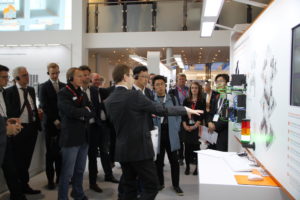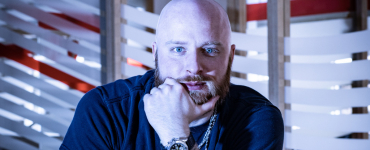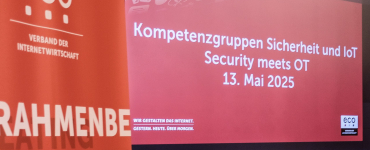The eco Association Competence Grop Internet of Things met for the traditional Guided Tour at the Hanover Fair in April. Under the motto of “Connect & Collaborate – the industry in digital transformation,” the group visited various solution providers from different segments of the IoT value chain and gained insight into the range of products, projects, partnerships, and ecosystems. Prior to this, there was a discussion round focused on the same motto.
The eco Association welcomed participants in the IC Lounge of the fair information center. We welcomed Andreas Keiger, Executive Vice President Global Business Unit IT, Rittal GmbH & Co. KG, and Michael Sahnau, Digital Business Transformation (IoT), Microsoft Germany, as official discussion partners. Moderated by Dr. Bettina Horster, Director of the Competence Group Internet of Things and Board Member of VIVAI Software AG, a highly interesting discussion developed, in the course of which more and more of those present became involved. Building on the results of the eco study “The German Industrial IoT Market,” we wanted to discuss the questions relating to the market and ecosystem, among others. Why cross-sector cooperation is so important for successful Industry 4.0 projects, and how processes of value creation are changing through new forms of data usage.
Andreas Keiger sees the future of data processing as being driven at the edge. He is convinced: “By 2023, 50% of data centers will be positioned where most of the data is generated.” He believes that for the success of IoT systems, connectivity to the IoT interfaces is in particular important, so that IT and OT (Operations Technology) can seamlessly intermesh. Keiger also sees a specialization within the value chain as essential for entrepreneurs (“you can’t cover all bases”).
Michael Sahnau noted that companies need to think about their positioning. He recommended that it is important to consider the questions of who to go into a cooperation model with, without running the risk that the “partner” could copy the business model in a few years’ time. For the successful realization of IoT offers, a critical mass of buyers is necessary. This is made clear by the migration of erstwhile competing map services, as well as carsharing services like DriveNow and Car2Go.
Positioning, specialization, and targeted cooperation – the participants took these success factors for the Industrial IoT market with them on the subsequent Guided Tour through the fair halls. eco member Rittal welcomed us to their community stand with Phoenix Contact and Eplan, and showed a prime example of successful cooperation in Industry 4.0 and Smart Engineering. The technology network brings together diverse segments along the value chain, from the digital provision of the component data in the form of a digital article, to the process during which the digital twin of the switch cabinet is generated, through to the digitally connected and intelligent production, which works with the data from the digital twin. There is even a guided examination of the end product via Augmented Reality with the aid of the digital “Norm”.

The next eco member on our tour: Microsoft. Here, we learned a great deal about business solutions based on Azure and successful IoT partner projects, among others with the technology corporation Bühler. The Swiss company uses IoT-analyzed data collected via cameras and sensors and stored in Azure, in order to detect and sort out contaminated grain, thus massively increasing the food quality. Microsoft and Bühler demonstrated a functioning collaboration of providers of software and industrial solutions.

Following this, our Guided Tour visited several further companies. The final stop was the German Telekom, who presented their comprehensive product portfolio, with the focus on smart planning, smart production, and smart logistics. Here again, it could be seen that nothing works without partnerships in the market: The industrial corporation Eaton have redesigned their components and machines with relevant sensors to make them smart objects, which communicate via narrowband IoT and the Telekom or T-Systems IoT platform, so that they can offer the operators further services through a Predictive Maintenance solution.
As our members demonstrate: the Internet industry plays the decisive role in the shaping of digital transformation. Essential for success in this is the cross industry and cross segment cooperation with other companies.
The tour came to an end with the participants taking home many impressions and the certainty that the Internet industry plays an essential role in the design of Industry 4.0.
Many thanks to all who were there and who were responsible for the stimulus!




